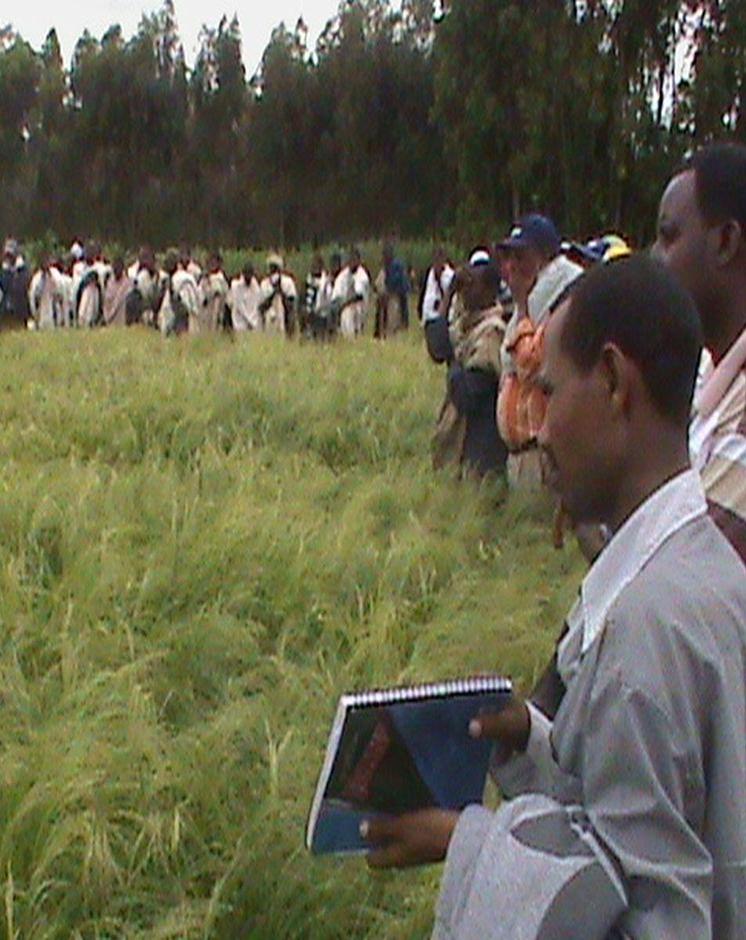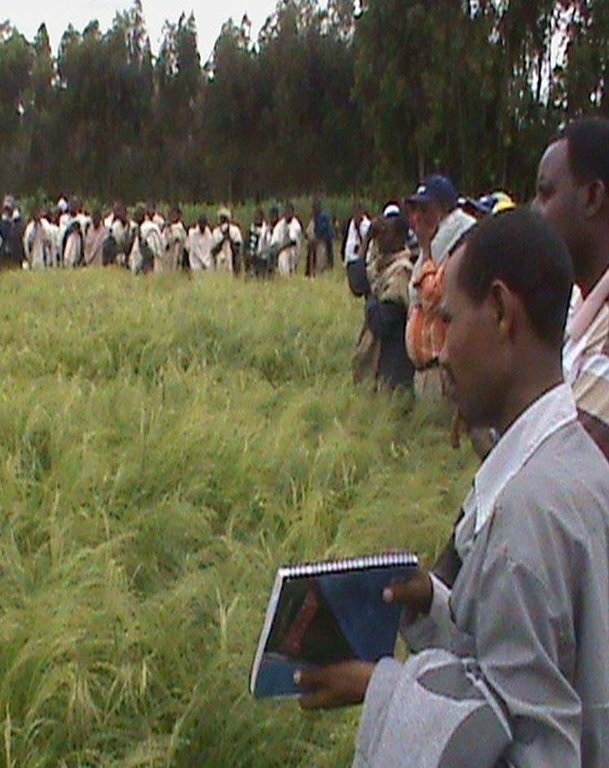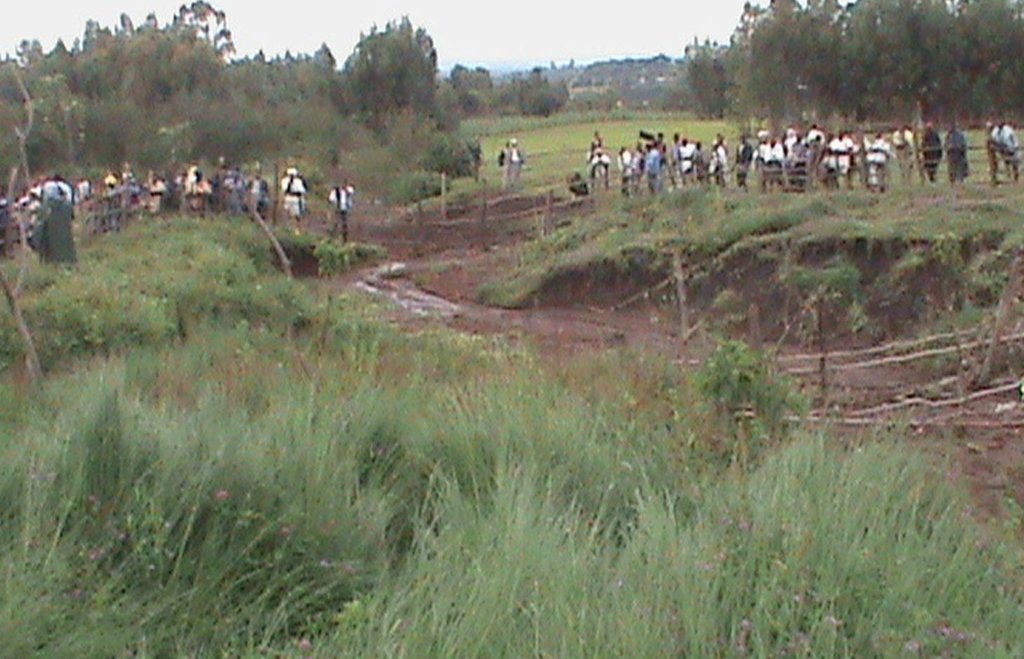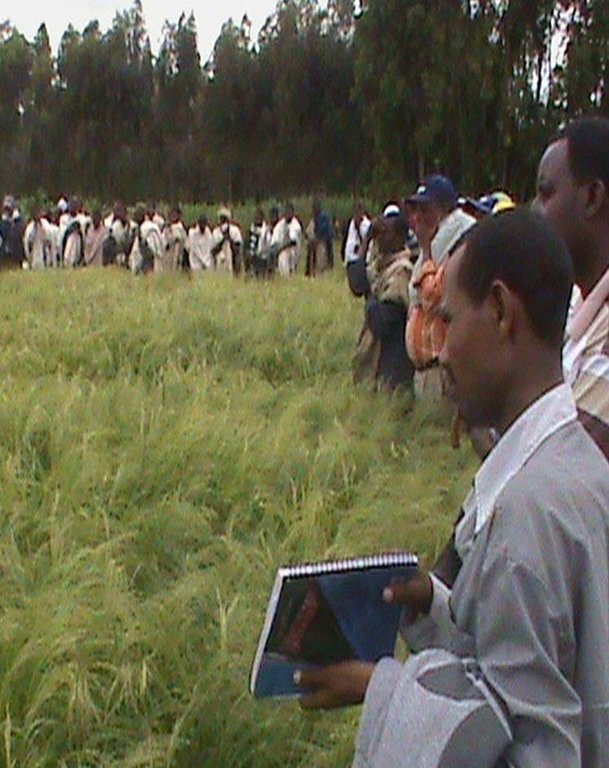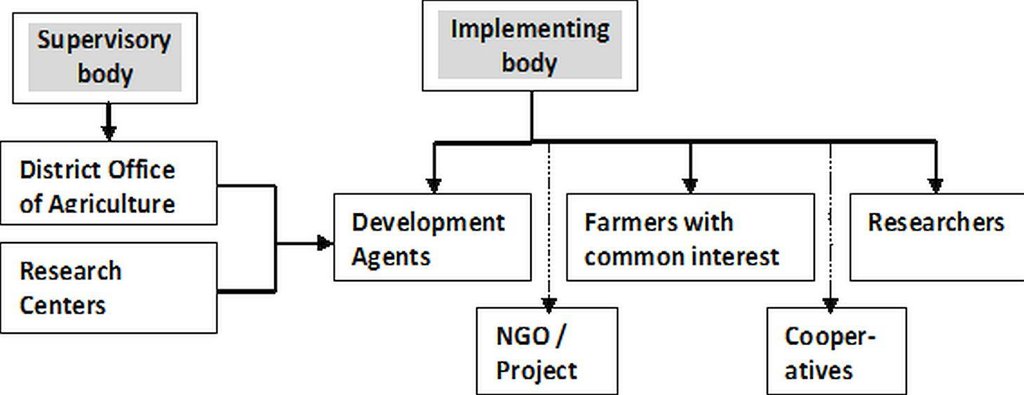Farmer-Research-Extension Group (FREG) [Ethiopie]
- Création :
- Mise à jour :
- Compilateur : Gizaw Desta Gessesse
- Rédacteur : –
- Examinateur : Fabian Ottiger
Yearsoader temeramari buden (Amharic)
approaches_2496 - Ethiopie
Voir les sections
Développer tout Réduire tout1. Informations générales
1.2 Coordonnées des personnes-ressources et des institutions impliquées dans l'évaluation et la documentation de l'Approche
Nom du ou des institutions qui ont facilité la documentation/ l'évaluation de l'Approche (si pertinent)
Water and Land Resource Centre (WLRC) - Ethiopie1.3 Conditions relatives à l'utilisation par WOCAT des données documentées
Quand les données ont-elles été compilées (sur le terrain)?
26/05/2014
Le compilateur et la(les) personne(s) ressource(s) acceptent les conditions relatives à l'utilisation par WOCAT des données documentées:
Oui
1.4 Références au(x) questionnaire(s) sur les Technologies de GDT
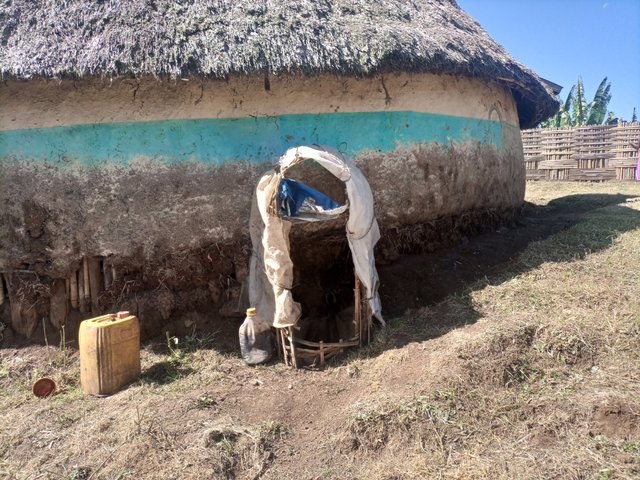
Collecte et utilisation d'urine du bétail [Ethiopie]
La collecte d'urine du bétail permet aux agriculteurs aux ressources limitées de récupérer les déchets de bétail riches en nutriments et de les utiliser pour remplacer l'engrais à base d'urée. Il s'agit d'un produit organique liquide permettant de restaurer la fertilité des sols et de lutter contre les ravageurs.
- Compilateur : GERBA LETA
2. Description de l'Approche de GDT
2.1 Courte description de l'Approche
Farmer-Research-Extension Group (FREG) is a grass root level platform aims to bridge gaps on agricultural technology transfer between research and extension linkage and provide a platform of 20-30 members from research, extension and farmer for their joint learning and active participatory role in agricultural technology evaluation and dessimination.
2.2 Description détaillée de l'Approche
Description détaillée de l'Approche:
Aims / objectives: FREG aims to facilitate the selection and transfer of agricultural technologies to end users through active participation and coordinated efforts of research-extension and farmer together. The objectives of FREG are: 1) evaluating and selecting improved agricultural technologies through participatory processes at field level, 2) demonstrating improved agricultural technologies to FREG members and other non-member land users in the villages, 3) facilitating farmer to farmer knowledge and technology exchange for faster and wider dissemination and adoption
Methods: In FREG, research takes initiation to facilitate the formation. The group is expected to identify and prioritize problems of their locality on its own and research and extension organizations could take facilitation to form or organize groups based on specific objectives. If the intention is to provide a range of technological options to fit needs and interests of farmers, it can be best developed with participation and through knowledge sharing among stakeholders (research, extension and farmer). Thus, group formation is based on individual and group interests. Those farmers who have similar interests are organized into a group based on proximity including both male and women farmers. Next, the group establish norms, share responsibility, design activity plan, and implement activities. The group meets regularly to evaluate performance of technologies at different stages. During each meeting, it is critical to visit on-farm activities of individual members and assess the relative performance. They develop their own criteria to rank and select the best technologies. Finally, they participate in field days and decide the best technologies for scale up to wider areas.
Stages of implementation: 1. Conduct awareness meeting of farmers about the available technologies for demonstration and scale up and their merits compared to the existing technologies in the hands of farmers.
2. Based on the awareness creation, collect the demands and interests of farmers in which of the technology options they want to involve. Organize into groups according to common interests.
3. Prepare and conduct training about the characteristics of available technologies, procedures of on-farm implementation and evaluation, farmer to farmer technology transfer, and work norms
4. FREG members develop their working norms, decide on the period of meetings, and develop plan of activities
5. Implement on-farm activities and evaluate the performance of planned activities on regular basis
6. Evaluate and rank the technology options based on their own criteria in order to select the best technologies
7. Organize field days to demonstrate and exchange the results of technology options to other non-member farmers and stakeholders. The technologies selected through FREG participatory evaluation procedures need to be supported with research evidences by ARARI.
8. Finally, each member farmer who is involved in on-farm technology evaluation took the responsibility to transfer the selected technology to at least 3-5 other farmers in his locality in order to facilitate quick dissemination, scaling up.
Role of stakeholders: Farmer: The farmers who have common interest on a given technology is responsible to lead the participatory technology selection
Development agents/extension: they should play facilitation and motivation role and help to encourage farmers to become member of FREG. They also follow up whether the FREG accomplish the planned activities and attend regular meetings
Research: research is involved in demonstration of technologies, in the initiation and establishment of FREG and plays a role of facilitation and technology supply. Research need to organize field days and advice other stakeholders to participate in the process
Project/WLRC: Provide material and technical support for the FREG and participate in the meetings and field days
Other stakeholders: The involved actors in the area should actively participate as a FREG member and during field days.
2.3 Photos de l'approche
2.5 Pays/ région/ lieux où l'Approche a été appliquée
Pays:
Ethiopie
Région/ Etat/ Province:
Amhara National Regional State
Autres spécifications du lieu :
Bahir Dar Zuria, Dembecha, Mecha, Yilmna Densa, Dessie Zuria, Basona Worana
2.6 Dates de début et de fin de l'Approche
Indiquez l'année de démarrage:
2005
2.7 Type d'Approche
- fondé sur un projet/ programme
2.8 Principaux objectifs de l'Approche
The Approach focused mainly on other activities than SLM (Participatory technology evaluation and selection, awareness creation, training, field visits, field days)
The main objective of FREG is to facilitate the participation and involvement of farmers, researchers and extension agents together in technology evaluation, selection and dessimination.
The SLM Approach addressed the following problems: The main problems targeted to address by implementing FREG approach are: low dissemination and adoption of agricultural and natural resource management technologies; linkage gap between research, who generate technologies, and extension who transfer and disseminate technologies; and low participation and involvement of farmers in technology development and selection processes.
2.9 Conditions favorisant ou entravant la mise en œuvre de la(des) Technologie(s) appliquée(s) sous l'Approche
disponibilité/ accès aux ressources et services financiers
- entrave
Low capacity of farmers to afford and use improved technologies
Treatment through the SLM Approach: The approach allows options of in-kind exchange, transfer and dissemination of technologies from farmer to farmer without incurring much cost to them
cadre institutionnel
- entrave
Inadequate linkage between research and extension that lead to low supply and transfer of technologies
Treatment through the SLM Approach: The FREG is the best link at grass root level where the demand (extension-farmer) and supply (research) can effectively interface
cadre juridique (régime foncier, droits d'utilisation des terres et de l'eau)
- entrave
The existing land ownership, land use rights / water rights hindered a little the approach implementation Since FREG approach is implemented on individual farm plots, entitlement of individual land use right is essential to invest on new agricultural technologies. At same time, water use right has contributed a lot to implement technologies working under irrigated and water harvesting systems. For example, if farmers are not allowed to dig shallow wells and divert streams it was not able to demonstrate and implement home garden in all watersheds and chickpea varieties at Debre Yacob
connaissances sur la GDT, accès aux supports techniques
- entrave
Lack of information about availability of technologies and inadequate participation of farmers in technology evaluation and selection processes that partly result in low adoption of existing technologies.
Treatment through the SLM Approach: The FREG approach provides choice of technologies for farmers and extension agents and take part in the evaluation and selection of technologies that fit to the system for wider adoption
3. Participation et rôles des parties prenantes impliquées dans l'Approche
3.1 Parties prenantes impliquées dans l'Approche et rôles
- exploitants locaux des terres / communautés locales
Individual land users who have common interest on specific technology
Land users are active members and take the leading responsibility of the process
- Spécialistes de la GDT/ conseillers agricoles
Agricultural specialists and development agents
- chercheurs
Researchers has the role to facilitate and provide technologies
- gouvernement local
The development agent together with kebele adminstration, District Agriculture Office Cooperative Agents for implementation and supervision
- gouvernement national (planificateurs, décideurs)
They were involved in the monitoring and evaluation stage
Si plusieurs parties prenantes sont impliquées, indiquez l'organisme chef de file ou l'institution responsable:
In FREG, both men and women can be members. Women play a great role in selecting technologies specially technologies related to food processing aspects
3.2 Participation des exploitants locaux des terres/ communautés locales aux différentes phases de l'Approche
| Participation des exploitants locaux des terres/ communautés locales | Spécifiez qui était impliqué et décrivez les activités | |
|---|---|---|
| initiation/ motivation | passive | Land users has no involvement in the initiation of the approach. Land users are part of the process after the planning phase. |
| planification | interactive | At planning stage of the approach, land users' are needed to express their interests and needs of technology options, and their interest to form a group. Land users participate by expressing their technology needs once information about available technology options is provided by the researchers and development agents. |
| mise en œuvre | interactive | Land users are expected beeing actively involved in every stage of the implementation and take the leading responsibility to all activities such as site selection, seed bed preparation, planting, cultivation, harvesting and reporting the productivity. |
| suivi/ évaluation | interactive | Land users are responsible to regularly evaluate the technologies and select the best for promotion and further scale up activities |
| Research | interactive | In the FREG approach, participatory technology evaluation and selection is the key element. Thus the land users are allowed to evaluate and select best and suitable ones among several options |
3.3 Diagramme/ organigramme (si disponible)
Description:
The district office of agriculture and research centers within ARARI are the supervisory bodies for the implementation of the FREG approach. The main implementer are the member farmers in the group, the researcher and development agent at kebele level. Depending on the availability and interest, NGOs/ Projects and cooperative agents are involved in the implementation of the process.
Auteur:
Gizaw Desta (WLRC, P.O.Box 8707, Addis Abeba, Ethiopia)
3.4 Prises de décision pour la sélection de la Technologie/ des Technologies
Indiquez qui a décidé de la sélection de la Technologie/ des Technologies à mettre en œuvre:
- principalement les exploitants des terres soutenus par des spécialistes de la GDT
Expliquez:
Different options of adapted technologies are supplied from research and the farmers can decide and choose the type of technology for demonstration and scale up
Decisions on the method of implementing the SLM Technology were made by mainly by SLM specialists with consultation of land users. Researchers and development agents with active participation of the FREG member farmers decide on the method of implementation
4. Soutien technique, renforcement des capacités et gestion des connaissances
4.1 Renforcement des capacités/ formation
Une formation a-t-elle été dispensée aux exploitants des terres/ autres parties prenantes?
Oui
Spécifiez qui a été formé:
- exploitants des terres
- personnels/ conseillers de terrain
- Other development agents are involved in cooperatives and other agr. development actions
Si pertinent, spécifiez le genre, l'âge, le statut, l'ethnie, etc.
It includes all land users who are members of FREG including women.
Formats de la formation:
- sur le tas
- entre agriculteurs (d'exploitants à exploitants)
- zones de démonstration
Thèmes abordés:
Awareness creation and characteristics of the technology, merits of new technologies compared to locally available and adapted technologies, procedures of implementing the technology evaluation and selection, the participation and involvement of FREG members at each stage of the implementation are contents of the training for FREG members before they start implementation.
Development agents and some experts from the district as well as project/NGO offices are contributing to the trainings about the implementation procedures and monitoring and evaluation activities.
4.2 Service de conseils
Les exploitants des terres ont-ils accès à un service de conseils?
Oui
Spécifiez si le service de conseils est fourni:
- dans des centres permanents
Décrivez/ commentez:
Name of method used for advisory service: Participatory Demonstration and Training Extension System (PADETES); Key elements: Training and awareness creation of farmers in FTCs , Provision of package of technologies, demonstrations in the Farmer Training Centers (FTC) and experience sharing visits, On job training; The method gives high emphasis to training and to some extent practical demonstrations supported with experience
sharing visits but less emphasis to advisory of farmers on spot
Advisory service is quite adequate to ensure the continuation of land conservation activities; The government service at Kebele level is adequate to ensure the implementation of FREG approach through active involvement of the development agents.
4.3 Renforcement des institutions (développement organisationnel)
Des institutions ont elles été mises en place ou renforcées par le biais de l'Approche?
- oui, modérément
Spécifiez à quel(s) niveau(x), ces institutions ont été renforcées ou mises en place:
- local
Précisez le type de soutien:
- renforcement des capacités/ formation
Donnez plus de détails:
Moderate support with awareness creation, training, and supply of some equipments. The local institutions like FREG and Farmer Training Centers (FTCs) are supported by training, and training and demonstration aid facilities
4.4 Suivi et évaluation
Le suivi et l'évaluation font ils partie de l'Approche? :
Oui
Commentaires:
bio-physical aspects were ad hoc monitored by government, land users through observations; indicators: growth performance of varieties or breeds, occurrence of disease and pests
bio-physical aspects were regular monitored by project staff, government through measurements; indicators: amount of inputs applied and labor, production and productivity of comparative technologies by WLRC and ARARI
socio-cultural aspects were regular monitored by project staff, government through measurements; indicators: Change in attitude of technology use, collective action within the group, productivity and economic benefits, exchange of knowledge and technology, transfer and dissemination rate measured jointly by WLRC and ARARI
area treated aspects were ad hoc monitored by project staff, government, land users through observations; indicators: Type of technology, number of users per technology, area covered by the technology
area treated aspects were regular monitored by project staff, government through measurements; indicators: Type of technology and number of users per technology by WLRC
There were several changes in the Approach as a result of monitoring and evaluation: After the monitoring and evaluation, the number of users increase, high demand and request for additional technologies, improved management of the technology were observed.
There were few changes in the Technology as a result of monitoring and evaluation: It sometimes occurs where there are more superior new technologies. For example, Faba Bean varieties were changed by superior one called Wolki variety.
4.5 Recherche
La recherche a-t-elle fait partie intégrante de l’Approche?
Oui
Spécifiez les thèmes:
- économie/ marketing
- technologie
Donnez plus de détails et indiquez qui a mené ces recherches:
Research play role of initiation of the approach, facilitate the processes, take part in the implementation, monitoring and evaluation, advisory services, supply of the technologies demanded by FREG members, and evaluate the costs and benefits of the demonstrated technologies. The research centers in 2.3.1.1 (i.e., five research centers within the Amhara Region Agricultural Research Institute, ARARI) are fully responsible to conduct demonstrations, pr-extension dissemination of technologies and socio-economic research activities through the FREG
Research was carried out on-farm
5. Financement et soutien matériel externe
5.1 Budget annuel de la composante GDT de l'Approche
Si le budget annuel précis n'est pas connu, indiquez une fourchette:
- 100 000-1 000 000
Commentez (par ex. principales sources de financement/ principaux bailleurs de fonds):
Approach costs were met by the following donors: local government (district, county, municipality, village etc) (Research centers (5 research centers within the Amhara Region Agricultural Reserch Institute, ARARI) provide capacity building through training and field visits, and supply of inputs (improved varieties) land allocation, fertilizer, labor): 15.0%; local community / land user(s) (land users contribute fertilizer, labor and allocate land for implementation): 85.0%
5.2 Soutiens financiers/ matériels fournis aux exploitants des terres
Les exploitants des terres ont-ils reçu un soutien financier/ matériel pour la mise en œuvre de la Technologie/ des Technologies?
Oui
5.3 Subventions pour des intrants spécifiques (incluant la main d'œuvre)
- intrants agricoles
| Spécifiez les intrants subventionnés | Dans quelle mesure | Spécifiez les subventions |
|---|---|---|
| semences | entièrement financé | |
| fruits, tree seedlings, breeds | entièrement financé | |
Si la main d'œuvre fournie par les exploitants des terres était un intrant substantiel, elle était:
- volontaire
Commentaires:
Labor to implement on-farm activities is covered by the FREG member or in group voluntarily
5.4 Crédits
Des crédits ont-ils été alloués à travers l'Approche pour les activités de GDT?
Oui
Spécifiez les conditions (taux d'intérêts, remboursements, etc.):
Credit is only partly available for specific technology types such as sheep breeds, fattening, potato seed storage and cooperative establishments, apiary
6. Analyses d'impact et conclusions
6.1 Impacts de l'Approche
Est-ce que l'Approche a aidé les exploitants des terres à mettre en œuvre et entretenir les Technologies de GDT?
- Non
- Oui, un peu
- Oui, modérément
- Oui, beaucoup
The approach helps to improve sustainable land management indirectly. Farmers who practiced improved technologies increase their productivity per unit area and are thereby capable to purchase more inputs and apply improved sustainable land management technologies. Those who earn high income can afford to invest on sustainable land management.
Est-ce que l'Approche a autonomisé les groupes socialement et économiquement défavorisés?
- Non
- Oui, un peu
- Oui, modérément
- Oui, beaucoup
Youth groups who are organized to provide services to farmers by operating and threshing teff and finger millet using introduced threshers gain some benefits. Women FREG households involved in sheep, poultry and energy saving stove production activities got benefit and improved their situation
Est-ce que l'Approche a amélioré les questions foncières et des droits d'utilisation qui entravent la mise en œuvre des Technologies?
- Non
- Oui, un peu
- Oui, modérément
- Oui, beaucoup
The problem is unlikely to be overcome in the near future. The land ownership or land use rights is highly associated with increase in population and then lead to land fragmentation. This implies the need for policy actions on land use rights.
Did other land users / projects adopt the Approach?
- Non
- Oui, un peu
- Oui, modérément
- Oui, beaucoup
The approach and/or technology transfer and utilization is gradually expanded to other villages and adjacent watersheds through farmer to farmer technology transfer and share of experiences during field days.
Did the Approach lead to improved livelihoods / human well-being?
- Non
- Oui, un peu
- Oui, modérément
- Oui, beaucoup
Using the approach, FREG members and some non-members particularly those who were involved in the production of teff, potato, wheat, barley, and faba bean had improved varieties; in the production of improved breeds of sheep and poultry they hac improved their livelihood situation. Some land users who also produced potato and forage seeds for sale were also benefited. In some watersheds, crop damages by rodent flocks were extremely minimized. FREG members who took part in manual maize sheller and multi-crop thresher technology promotion activities were highly benefited in saving high labor requirement.
Did the Approach help to alleviate poverty?
- Non
- Oui, un peu
- Oui, modérément
- Oui, beaucoup
FREG members who were involved in the production of improved agricultural technologies are gradually going to improve their poverty situation.
6.2 Principale motivation des exploitants des terres pour mettre en œuvre la GDT
- augmenter la production
The immediate interest and objectives of farmers is to increase productivity per unit of their land
- paiements/ subventions
Initially some have been motivated by giving them access to improved technologies & inputs
- well-being and livelihoods improvement
They realized that the approache ultimately can improve production, income and livelihood
6.3 Durabilité des activités de l'Approche
Les exploitants des terres peuvent-ils poursuivre ce qui a été mis en œuvre par le biais de l'Approche (sans soutien extérieur)?
- oui
Si oui, décrivez de quelle manière:
The technologies remain for long in the hands of FREG member farmers. They continue to produce the technology and disseminate in the area through farmer to farmer dissemination system. FREG members acquire capacity to access new technologies from research, extension and input supply seed agencies using the established linkage mechanism. Finally, these ensure sustainability of the approach that aim the transfer and adoption of technologies by farmers
6.4 Points forts/ avantages de l'Approche
| Points forts/ avantages/ possibilités du point de vue de l'exploitant des terres |
|---|
| Increase the supply of new technologies. (How to sustain/ enhance this strength: Strengthen and expand FREG approach, and the role of research and seed enterprises.) |
| Points forts/ avantages/ possibilités du point de vue du compilateur ou d'une autre personne ressource clé |
|---|
| Improves communication and information exchange thereby improving social relations. (How to sustain/ enhance this strength: Can be used as an entry point for social learning a process by which stakeholders in a group learn how to innovate and adopt in response to changing social and environmental conditions.) |
| Increase productivity and efficiency, and empowers farmers economically. (How to sustain/ enhance this strength: Provide variety of technology options every year based on their needs and interests.) |
| It gives an opportunity for the research system to scale up/out shelved technologies and increase the visibility of the research outputs. (How to sustain/ enhance this strength: Encourage research programmes of the research system to use the FREG approach for any technology dissemination and outreach services.) |
| Strengthen the linkage between research and extension at grass root level. (How to sustain/ enhance this strength: Empower the FREG to influence the research agenda and extension system so as to fit to their interests and needs.) |
| Increase the attitude and technical knowledge of land users where to access technologies, and about the merits of improved technologies and their management techniques, and ways of evaluation and selection of technology options. (How to sustain/ enhance this strength: Establish system of equal involvement of members, strong leadership, and supervision system in order to support continuously and empower the FREG.) |
6.5 Faiblesses/ inconvénients de l'Approche et moyens de les surmonter
| Faiblesses/ inconvénients/ risques du point de vue de l’exploitant des terres | Comment peuvent-ils être surmontés? |
|---|---|
| Low price of grain as a whole including the improved crop varieties like maize | Undertake market promotion and market linkage activities, and create food menus for home consumption . |
| Faiblesses/ inconvénients/ risques du point de vue du compilateur ou d'une autre personne ressource clé | Comment peuvent-ils être surmontés? |
|---|---|
| There is loss of land races by introducing new crop varieties. | Practice systematic conservation of land races and indigenous species. |
| Land users do not maintain the quality of the technology for longer periods. | Develop capacity of land users in maintaining and handling of quality technologies. |
| Lack of access to market for new and improved technologies. | Complement the FREG approach with value chain systems. |
7. Références et liens
7.1 Méthodes/ sources d'information
- visites de terrain, enquêtes sur le terrain
- interviews/entretiens avec les exploitants des terres
Liens et modules
Développer tout Réduire toutLiens

Collecte et utilisation d'urine du bétail [Ethiopie]
La collecte d'urine du bétail permet aux agriculteurs aux ressources limitées de récupérer les déchets de bétail riches en nutriments et de les utiliser pour remplacer l'engrais à base d'urée. Il s'agit d'un produit organique liquide permettant de restaurer la fertilité des sols et de lutter contre les ravageurs.
- Compilateur : GERBA LETA
Modules
Aucun module trouvé


